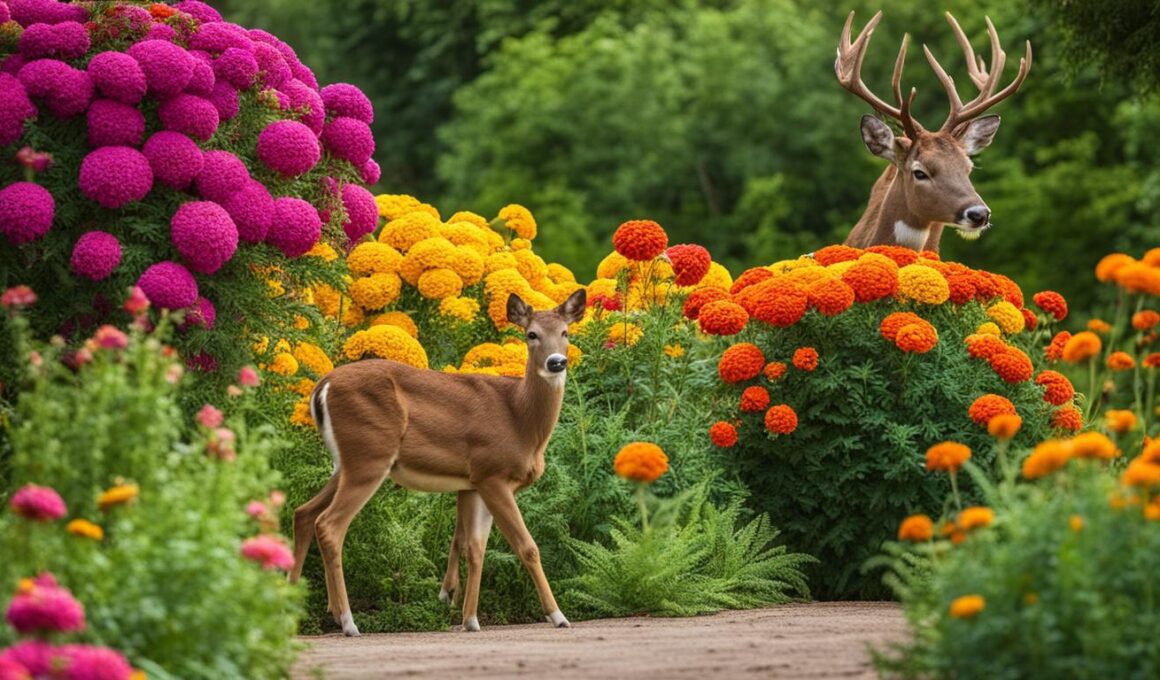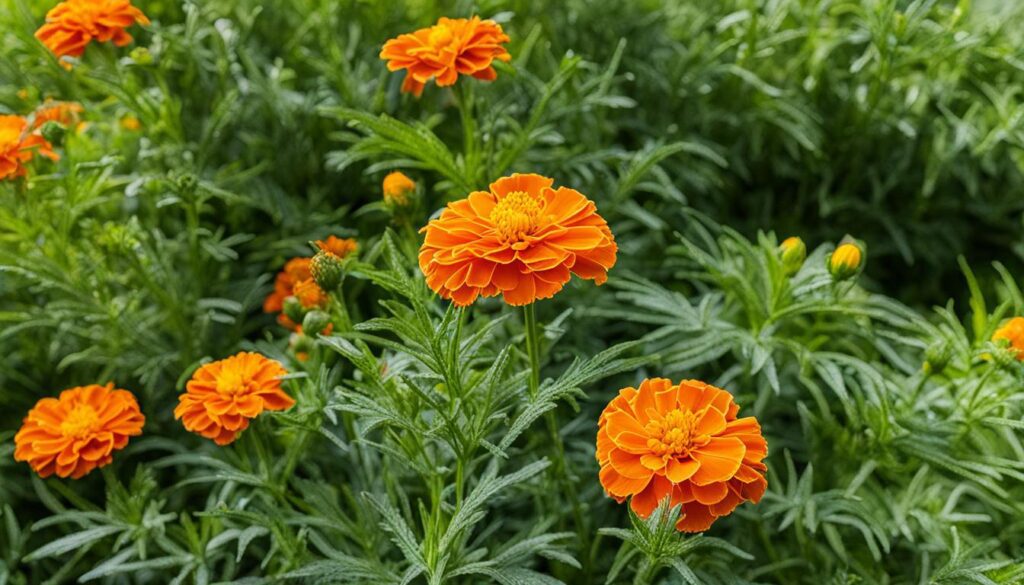If you’re an avid gardener, you know the frustration of having your plants nibbled on by deer. These graceful creatures can wreak havoc on your carefully cultivated garden, leaving you wondering which plants are safe from their hungry appetites. One plant that often comes up in discussions of deer-resistant options is the marigold.
Are marigolds truly deer resistant? The answer lies in their strong smell and finely textured foliage, which deer tend to find unappetizing. While no plant is completely deer-proof, marigolds are generally safe from deer damage.
In this article, we’ll delve deeper into the topic of marigolds and their relationship with deer. We’ll explore why marigolds are considered deer resistant, highlight some of the most deer-resistant marigold varieties, discuss how to protect your marigolds from deer, and provide tips on using marigolds strategically in your garden to repel deer.
Key Takeaways:
- Marigolds are generally considered deer resistant due to their strong smell and bitter taste.
- No plant is completely immune to deer damage, but marigolds are a good choice for gardeners looking to protect their plants.
- Some of the most effective deer-resistant marigold varieties include African Marigold, French Marigold, Mayan Marigold, Mexican Marigold, and Sweet Scented Marigold.
- To protect your marigolds from deer, choose deer-resistant varieties, eliminate other attractive plants, get rid of hiding spots, use deer deterrents and barriers, and plant other deer-repelling plants.
- You can use marigolds strategically in your garden by planting a barrier of marigolds, planting multiple marigolds, and combining them with other deer-repelling plants.
Are Marigolds Truly Deer Resistant?
Marigolds are considered deer resistant because deer do not particularly like the taste or smell of these flowers. While marigolds are not toxic to deer, they contain irritating substances that can affect the stomach lining if consumed in large quantities. Additionally, deer do not like the texture of marigold leaves and petals, which have a rough and bitter taste. However, it is important to note that no plant is completely deer-proof, and hungry deer may still eat marigolds if food sources are scarce.
Most Deer Resistant Marigold Varieties
When it comes to protecting your garden from deer, choosing the right marigold varieties can make all the difference. Here are some of the most effective deer-resistant marigold varieties:
-
African Marigold (Tagetes erecta): With its strong smell and segmented leaves, African Marigold is unappealing to deer. This variety can grow up to 4 feet tall and 2 feet wide.
- French Marigold (Tagetes patula): Known for its vibrant orange flowers and aromatic fragrance, French Marigold is disliked by deer. It typically grows to about 1 foot tall and wide.
- Mayan Marigold: For a slightly more exotic option, consider Mayan Marigolds. These marigolds have yellow blooms and lacey leaves that deter deer. They can grow up to 1 foot tall and 2 feet wide.
- Mexican Marigold: If you’re looking for a larger and more sprawling variety, Mexican Marigold may be the perfect choice. Its textured leaves and intense fragrance repel deer. Mexican Marigold can reach heights of 4 to 6 feet.
- Sweet Scented Marigold: Also known as Mexican mint marigold, this variety has an anise scent that deer dislike. It grows up to 30 inches tall and thrives in full sun or partial shade.
By planting these deer-resistant marigold varieties in your garden, you can enjoy their beauty while keeping deer at bay.
How to Protect Your Marigolds From Deer
To protect your marigolds from deer, there are several strategies you can use:
-
Choose deer-resistant marigold varieties: Selecting the most effective marigold varieties is the first line of defense against deer. Research and choose varieties known for their strong smell and unappealing taste to deer.
-
Eliminate other attractive plants: Remove other plants from your garden that deer may find more enticing than marigolds. This reduces the chances of deer nibbling on your marigolds.
-
Get rid of hiding spots: Deer prefer areas with dense vegetation where they can hide from potential predators. Clearing out dense bushes and trees reduces hiding spots and deters deer from entering your garden.
-
Use deer deterrents and barriers: Install physical barriers such as fences or hedges to prevent deer from accessing your marigolds. Motion-activated sprinklers, wind chimes, or having pets patrol the area can also deter deer.
-
Plant other deer-repelling plants: Surrounding your marigolds with other plants that have strong scents or undesirable textures can further deter deer from approaching your garden. Some examples include autumn crocus, chives, lavender, and rosemary.
By following these strategies, you can protect your marigolds from deer and ensure they thrive in your garden.
How to Use Marigolds in Your Garden to Repel Deer
Marigolds can be a valuable tool in your garden to repel deer and protect your other plants. By strategically using marigolds, you can minimize the risk of deer damage and enjoy a flourishing garden. Here are some tips on how to use marigolds effectively:
- Plant a barrier of marigolds: Create a protective barrier of marigolds around plants that are more vulnerable to deer damage. The strong smell of marigolds will confuse deer and make them less likely to approach. Plant the marigolds in a dense formation to maximize their repellent effect.
- Plant multiple marigolds: While planting one or two marigold plants can offer some protection, it may not be enough to repel determined deer. To strengthen the scent and make it more effective, plant multiple marigolds together. This will create a stronger aroma that will deter deer from coming near.
- Combine with other deer-repelling plants: Enhance the deer-repelling effect by combining marigolds with other plants known to deter deer. Consider planting herbs like thyme, mint, or sage, which have strong scents that can help repel deer. The combination of multiple repellent plants can create a more effective deterrent for deer.
By incorporating these tactics into your gardening routine, you can significantly reduce the chances of deer damaging your plants. Marigolds, along with other deer-repelling plants, can create a protective barrier and ensure the health and beauty of your garden.
Conclusion
In conclusion, marigolds are a great choice for gardeners looking to protect their plants from deer damage. While no plant is completely immune to deer, marigolds are generally considered deer resistant due to their strong smell and bitter taste. By selecting deer-resistant varieties such as African Marigold, French Marigold, Mayan Marigold, Mexican Marigold, and Sweet Scented Marigold, you can minimize the risk of deer grazing on your marigolds.
To further protect your marigolds and other prized plants, it is recommended to eliminate other attractive plants that deer may prefer. Clearing out hiding spots and using physical barriers like fences or hedges can also deter deer from accessing your garden. Additionally, planting other deer-repelling plants such as autumn crocus, chives, lavender, and rosemary around your marigolds can enhance their deer-repellent effect.
Remember, no method is foolproof, but by following these gardening tips and using marigolds strategically in your garden, you can significantly reduce the chances of deer damage to your marigolds. Enjoy the beauty of your marigold-filled garden while keeping those pesky deer at bay!
Will Using Weed and Feed Affect Deer’s Appetite for Marigolds in My Garden?
Using weed and feed at the optimal timing for weed control may affect deer’s appetite for marigolds in your garden. The chemicals in weed and feed can deter deer from munching on your flowers, providing a natural barrier to protect your garden.
FAQ
Do marigolds repel deer?
Yes, marigolds are considered deer-resistant plants. While there is no such thing as a completely deer-proof plant, marigolds have a strong smell and finely textured foliage that deer find unappetizing, making them generally safe from deer damage.
Why are marigolds deer resistant?
Deer do not particularly like the taste or smell of marigolds. These flowers contain irritating substances that can affect the stomach lining if consumed in large quantities. Additionally, the rough and bitter taste of marigold leaves and petals deters deer from eating them.
What are some deer-resistant marigold varieties?
Some deer-resistant marigold varieties include African Marigold (Tagetes erecta), French Marigold (Tagetes patula), Mayan Marigold, Mexican Marigold, and Sweet Scented Marigold. These varieties have strong smells, segmented leaves, or lacey leaves that deer find unappealing.
How can I protect my marigolds from deer?
To protect your marigolds from deer, you can choose deer-resistant marigold varieties, eliminate other attractive plants, get rid of hiding spots, use deer deterrents and barriers, and plant other deer-repelling plants, such as autumn crocus, chives, lavender, and rosemary.
How can I use marigolds in my garden to repel deer?
You can strategically use marigolds in your garden to repel deer by planting a barrier of marigolds around more vulnerable plants, planting multiple marigolds together to strengthen the scent, and combining marigolds with other deer-repelling plants like thyme, mint, or sage.











